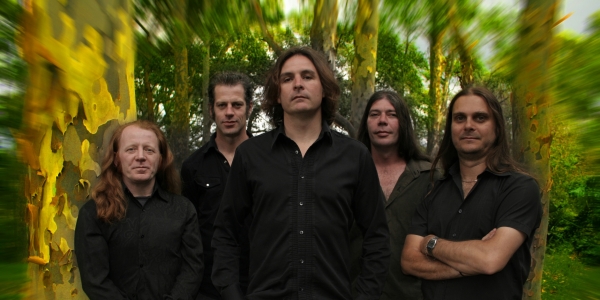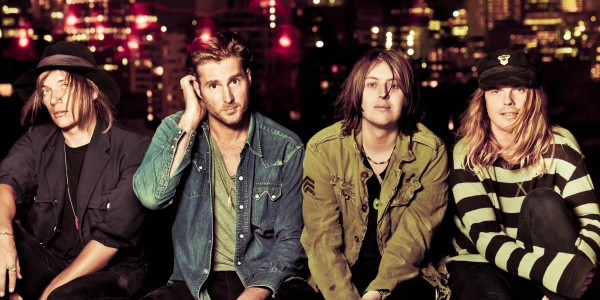Having scaled heady heights of success in the early to mid 1990s, Tumbleweed’s end was strangely enigmatic. “Richie and I consciously didn’t do a final show,” Curley admits. A lot of it would come down to the fact that both Curley and Lewis have admitted that the band’s internal relationships could have been handled better. “It all got a bit messy towards the end,” Curley concedes.
Back before they fractured, Tumbleweed were at the apex of the Australian independent music scene. With their stoner rock roots, Tumbleweed were part of the zeitgeist for the slacker generation that grew into commercial prominence in the early 1990s. Happily Curley doesn’t see any problem with Tumbleweed’s characterisation as a stereotypical stoner rock band. “I think we still are!” he laughs.
“I suppose we’ve only got ourselves to blame,” he adds. “Every band needs a label, and we flaunted our own label. We were 19, and we discovered Hendrix and a bong.”
By the early 1990s Tumbleweed had evolved from local Wollongong favourites to headlining their own national tours, with high-profile support slots with the likes of Nirvana and Mudhoney for good measure. “I’m not sure if there was a defining moment,” Curley says when asked him if there was a time when he realised Tumbleweed had ‘made it’.
“We were big fans of Australian music, so just playing pubs was a real buzz for us. I suppose I still think of that original relief that we felt when we became a headline band, and not just a support band,” Curley nods.
At the heart of Tumbleweed was the songwriting dynamic between Curley and Lewis. The guitarist freely admits to mining the riffs of the past for his own musical inspiration. “I always treated listening to music as research,” he figures. “You always take inspiration from your favourite players. But you wouldn’t necessary tell the guy you were writing with where you’d got a riff or an idea from – he’d just add something else that’d make it even better.
“And,” he adds, “Richie had a great knack for melody.”
Despite the band’s success, Curley figures that Tumbleweed never contemplated moving from Wollongong to Sydney. “I moved to Sydney for a very short time,” he recalls, “but I didn’t stay long – I didn’t like it.”
Even without the pressures of the big city, like so many young bands before them, the members of Tumbleweed struggled to make sense of the competing commercial, artistic and egotistical dynamics that make up a musical collective. “We let the ego stuff get in the way of the band and its unique chemistry,” Curley admits. “I definitely regret that the band broke-up – I’d much rather be living in a nice big house!” he laughs.
With all of Tumbleweed’s members still living in the same city, it was inevitable that the members’ paths would cross. “Because we all live in Wollongong and we were still playing in bands, we couldn’t avoid seeing each other for ever,” Curley nods.
It may not have been inevitable, but he pairing of Curley and Lewis had realised far too late in the piece that the chemistry within Tumbleweed was unique. When the opportunity came for Tumbleweed to reform to play Homebake a few years ago, inter-band tensions were left at the rehearsal room door. “I suppose I was apprehensive at first, a bit tense but also very excited,” Curley recalls.
“It’s a bit of a cliché, but once we started playing the music, everything starts again.”
On stage the chemistry also returned, albeit gradually at first. “It took us about a year to get across it all – we all had our bogey songs,” Curley grins. “It was really only last summer that we found that effortless chemistry. We found our mojo, and we just want to keep that going.”
Initially, the atmosphere was “a bit weird” until things settled back into place. “We started back playing to huge crowds, which was a lot different to how we’d started out originally,” Curley recalls. “We were a bit panicked early trying to remember the songs, but we can enjoy it a lot more now.”
While Tumbleweed’s sporadic performance schedule will ensure the band don’t take anything for granted, Curley knows there’s a limit to the slacker schedule. “We don’t want to run the risk of taking that too far,” he says.
The recent re-release of Tumbleweed’s Waterfront material on local re-release label Aztec Music also contributed to the band’s reformation cause – and better understanding of their musical legacy. Curley says there’s still more archival material to come when the opportunity presents itself. “In those days, the record company would send us into the studio to do various B-sides, so there’s a few of those lying around. But there’s no plans to put it out at this stage.”
As for the matter of new Tumbleweed material, Curley is circumspect. “We’ve got a few songs floating around – there’s only so many times you can keep playing old songs,” he grins. “It’s really a case of getting enough time together to sit down and write.”
We’ve been back together for two years, and we’ve done two songs – that’s not too bad,” he laughs.







